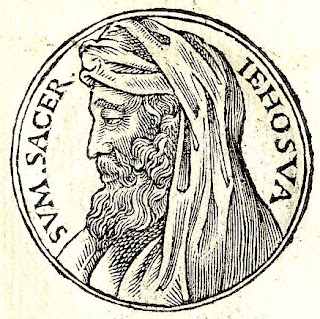When I finished the last verse of this morning's passages, I mumbled, "Wow, talk about deep cuts." I mumbled this aloud, to myself, as there was no one else there (though there may be a squirrel lurking in the attic just above where I read in the morning...). Deep cuts, as in, less frequently heard tracks from albums. As in, I bet myself a nickel that neither of these texts was in the lectionary, because, boy howdy, I'da remembered them. I won. They're not there.
The prophet Zechariah is a post-exilic truth-teller, whose great concern is the rebuilding of the Temple in Jerusalem and the re-establishment there of prayer and worship, under the authority of the priesthood. This is a bittersweet time in the history of God's covenant people. The exile is over, and the people-- those who have survived, and the new generations that have arisen-- are returning to Jerusalem. And there is joy about the rebuilding of the Temple, though it is not and will never be the Temple of Solomon. That loss remains a permanent scar on the communal psyche.
This passage from Zechariah (which is attributed to the prophet, but...???) involves the high priest Joshua and an angel and Satan. Now, because this is the Hebrew Scriptures, Satan isn't The Devil, as Christians have learned to think of him; here, he's a member of the heavenly court whose job it is to make sure mortals are as moral as they try to appear. In Hebrew, it's Ha Satan, which means, literally, The Tempter, or The Tester, or The Accuser. (A little like that guy Jesus ran into in the wilderness.)
And now that it's afternoon and I've refreshed my memory about all this (ahem), the scene as it unfolds makes a little more sense. But at 6:45 this morning, it was kind of like...
 |
| Joshua, the High Priest.* Note the turban. |
But then, even in my early morning stupor, there was something oddly moving about "Let them put a clean turban on his head." And suddenly, to me, Joshua was every homeless man I've seen on the streets of the city, filthy clothes, rotting teeth, who had a mother who loved him and a job after the army for which he wore a jacket and tie. And even in my semi-conscious state, I could envision this man, realizing he had another chance after it had seemed as if that was someone else's life, an existence he could only dimly remember. And the gravity of his office is engraved on some kind of stone (jewel?), and it represents his promise that, yes, yes, we can make this our home again, yes, I promise to walk in God's ways and keep these requirements, and is it true? That all of us are welcome here, and we will, truly, live, each one, under their vine and fig tree (or, in their little apartment), in peace, unafraid?
* Image: From "Promptuarii Iconum Insigniorum," published by Guillaume Rouille (1518?-1589). Courtesy of Wikimedia Commons.

No comments:
Post a Comment